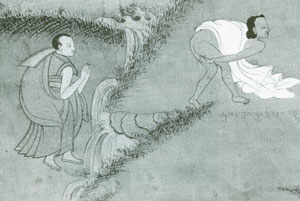
Thus have I Heard:
When the time had come for Gampopa to part from his teacher Milarepa, Milarepa placed the soles of his feet on the top of Gampopa’s head, symbolizing that their work together was done. As Gampopa was about to depart, however, Milarepa added, “There is one particularly profound teaching I have yet to impart to anyone, but it is too precious to give away just like that, so you may go.” After this, the two embraced and Gampopa went on his way.
Gampopa had nearly passed out of earshot when he heard Milarepa calling out to him. Hurrying back, he knelt once more before his teacher, whereupon Milarepa turned his back to him and, lifting up his robe, exposed his bare buttocks, entirely covered with thick calluses from years of meditating on a rock.
“This is my final teaching to you, my beloved heart-son,” said Milarepa.
“Now just do it.”
The story exists in various forms, but in each version I have read the point seems to be the same: “Exert yourself to the fullest; whether or not you become a buddha is entirely up to you!”
And yet, I wonder . . .
Something about the part that says “Just do it” makes it seem tacked on by a later author. And I ask myself, Could ascetic heroism possibly be the profound teaching Milarepa was referring to?
With nothing but imagination and my own experience to go on, I feel compelled to reinterpret the story as follows: The time has come for Gampopa to part from his teacher. At this point he has learned all he needs to know. The rest, true enough, is entirely up to him. And so Milarepa performs the customary ritual, and then the disciple is gone. What agony, not knowing what will become of his “beloved heart-son”! Knowing that the teaching has been completed and there is no further excuse to call him back, Milarepa searches his own heart to see if there isn’t something—some last thing he has forgotten—when suddenly he realizes what it is! And he shouts.
What Milarepa shows his disciple in that final encounter is the one thing he has kept hidden from everyone until now—his own desperate, heartbreaking struggle to attain the truth of dharma. His pain, his discomfort, his years of doubt. That is the thing Gampopa most needs to see; without it he cannot himself become a great teacher. What Milarepa shows Gampopa is not his buttocks but his heart.